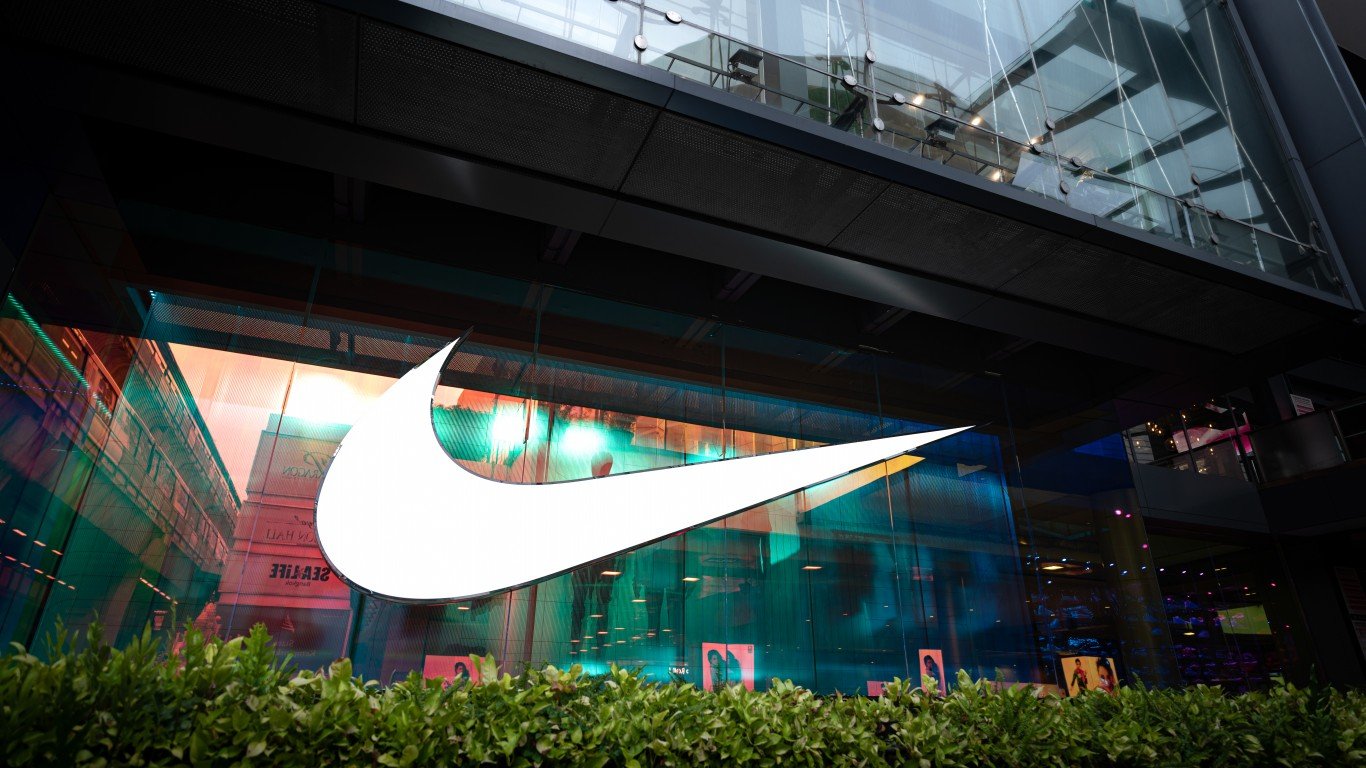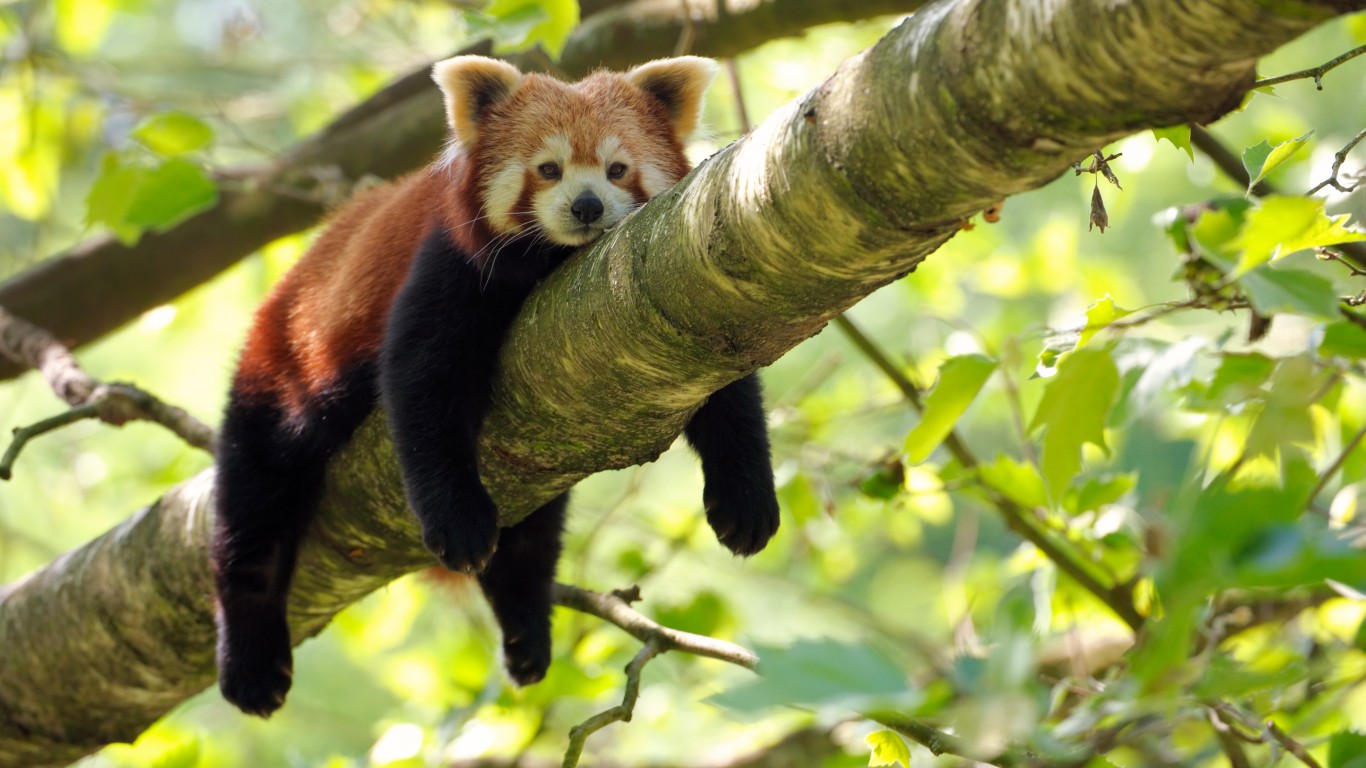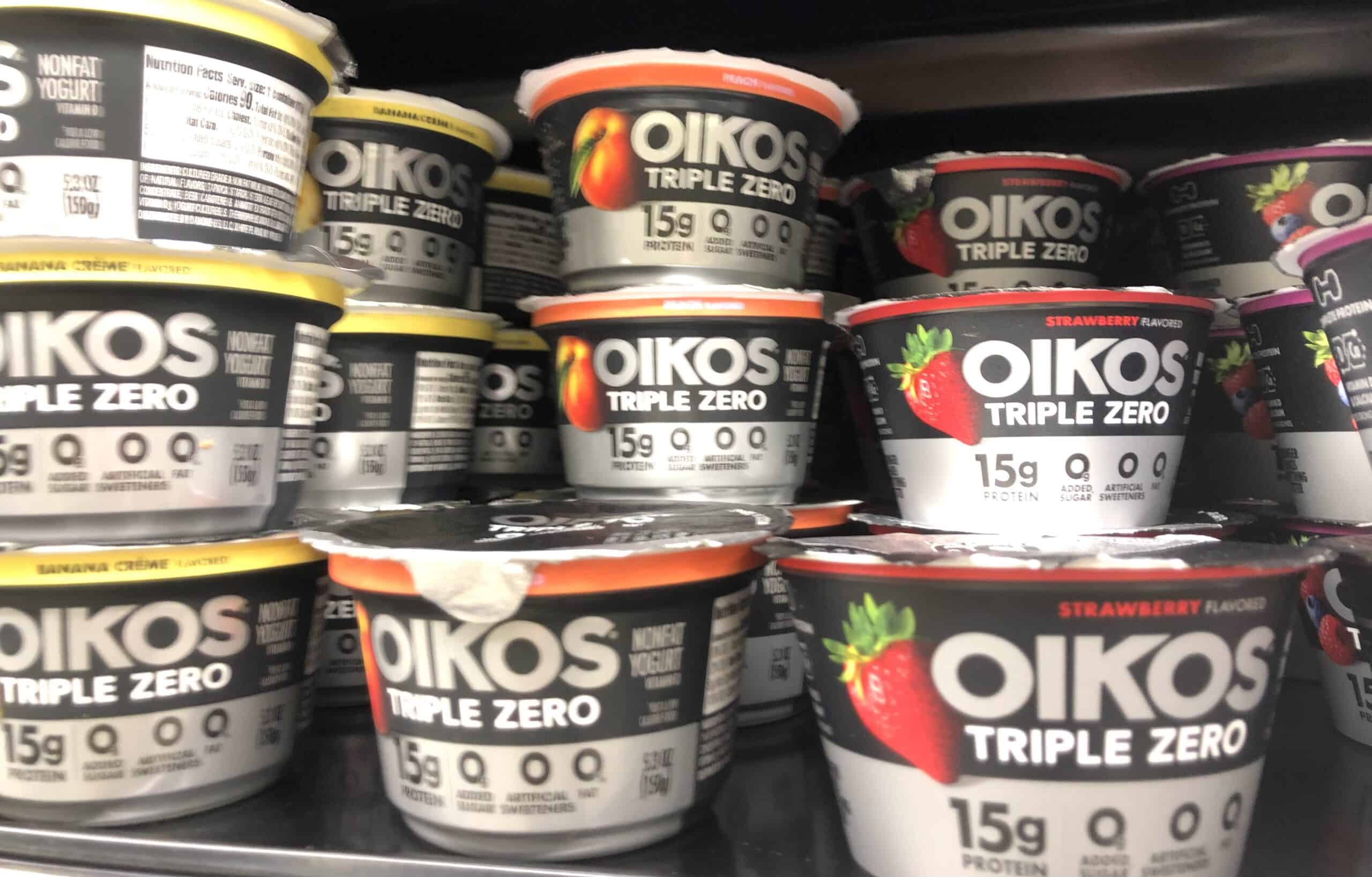

While it had been available in specialty stores catering to Greek communities before, Greek yogurt swept the U.S. off its feet in the late-aughts. Companies, including Chobani and Fage, created a market for Greek yogurt in the U.S. with strategic advertising campaigns. Beyond the hype, Greek yogurt’s thicker texture, higher protein content, and tangier taste appealed to American consumers, leading to its popularity and proliferation in the U.S. market. Since then, several brands have tossed their hats into the Greek yogurt ring. So, grab a spoon, pull up a chair, and enjoy 24/7 Wall St.’s list of 10 Greek yogurt brands to try presented from the tried and true to some of the newer kids on the block. From Greek roots to the Grateful Dead, these brands have stories!
1. Fage
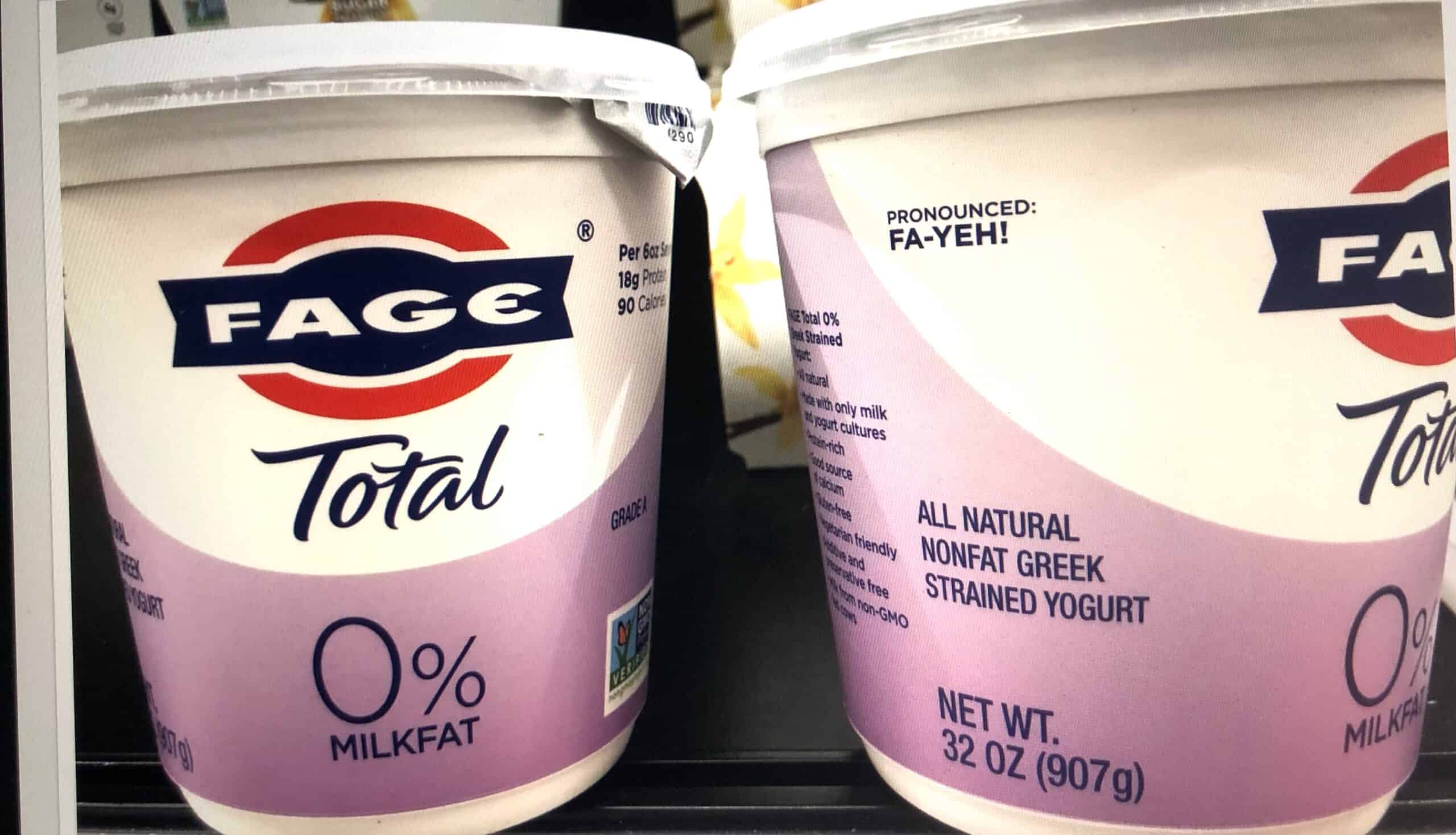
- Parent/owner: Filippou family
- Introduced: 1926
- Pricepoint: $0.20/ounce
Yea for Fage
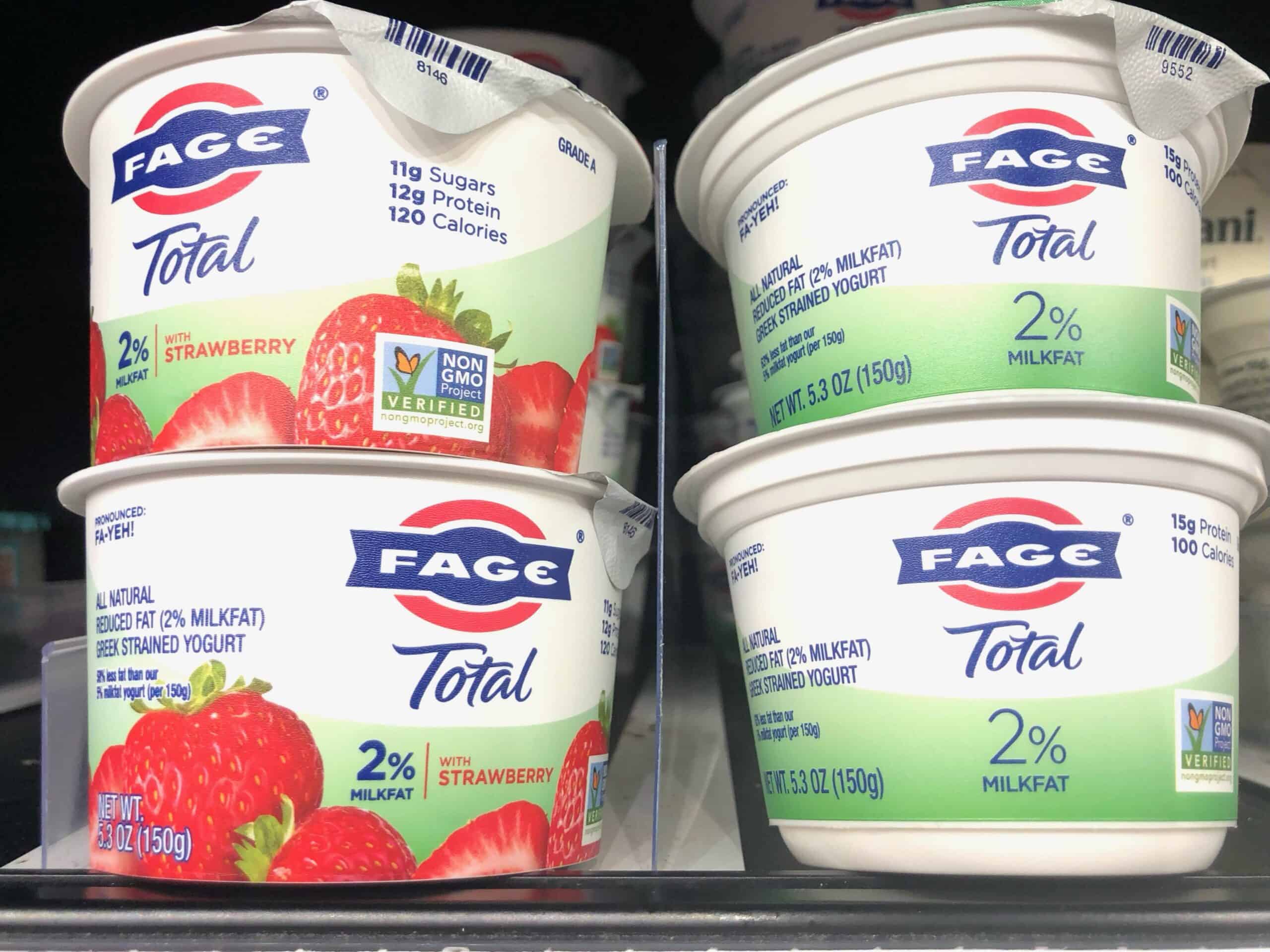
Like the German poet and philosopher Goethe, pronounced Gurt-eh, Fage, pronounced Fa-yeh, undoubtedly gets mispronounced. A lot. Until I started doing research for this post, I had no idea this brand’s name had two syllables. I’ve been calling it Faj, which rhymes with Taj. My neighbor thought it was Feige, rhymes with beige. Live and learn. No matter how you say it, Fage is the original Greek yogurt. Introduced in Greece in 1926, the company continues to be privately owned by the Filippou family. As a family-owned business, Fage prides itself on using only natural ingredients. This commitment to quality has earned Fage a loyal following in Greece and the U.S.
2. Nancy’s
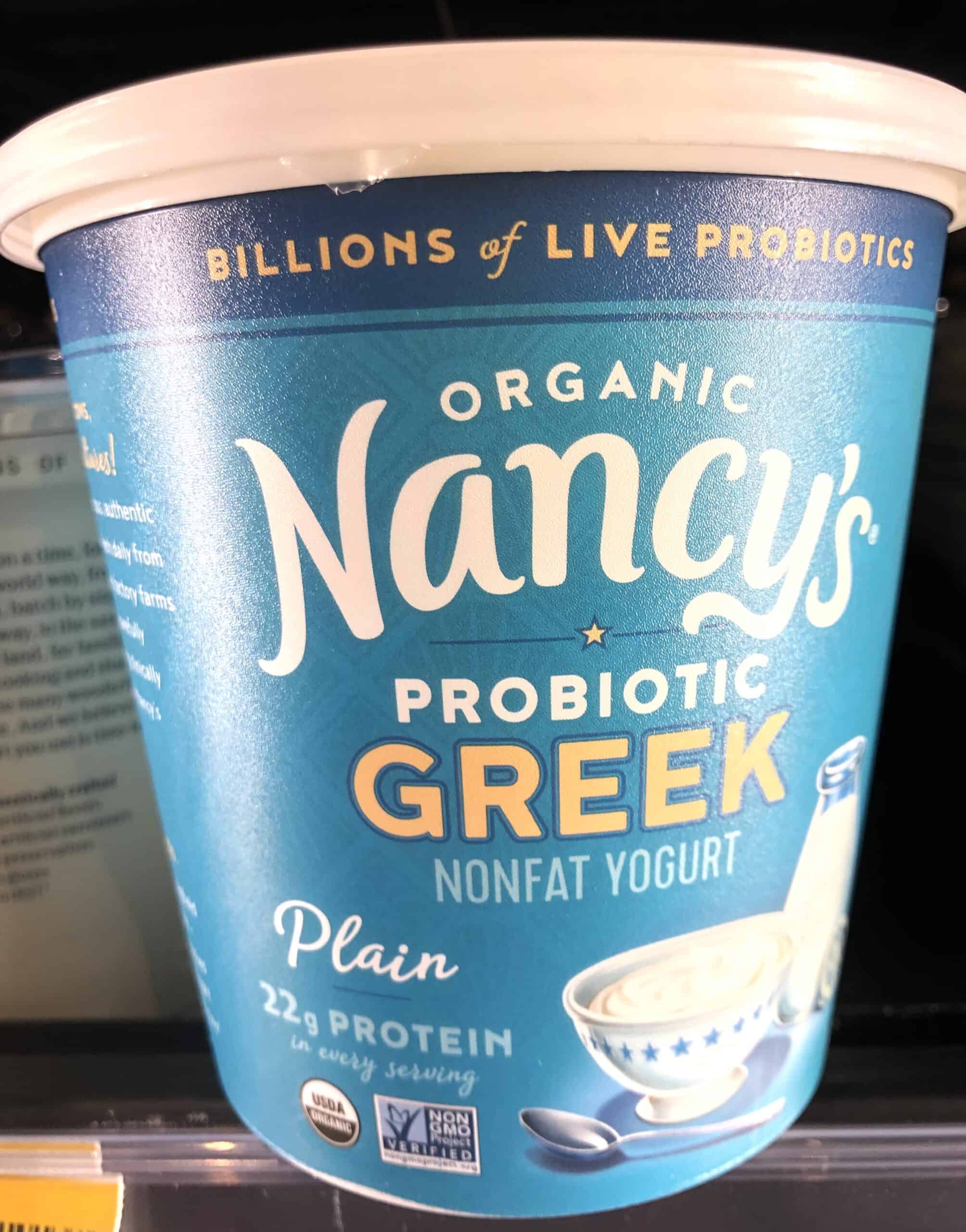
- Parent/owner: Sue and Chuck Kesey
- Introduced: 1970
- Pricepoint: $0.19/ounce
Grateful For Nancy
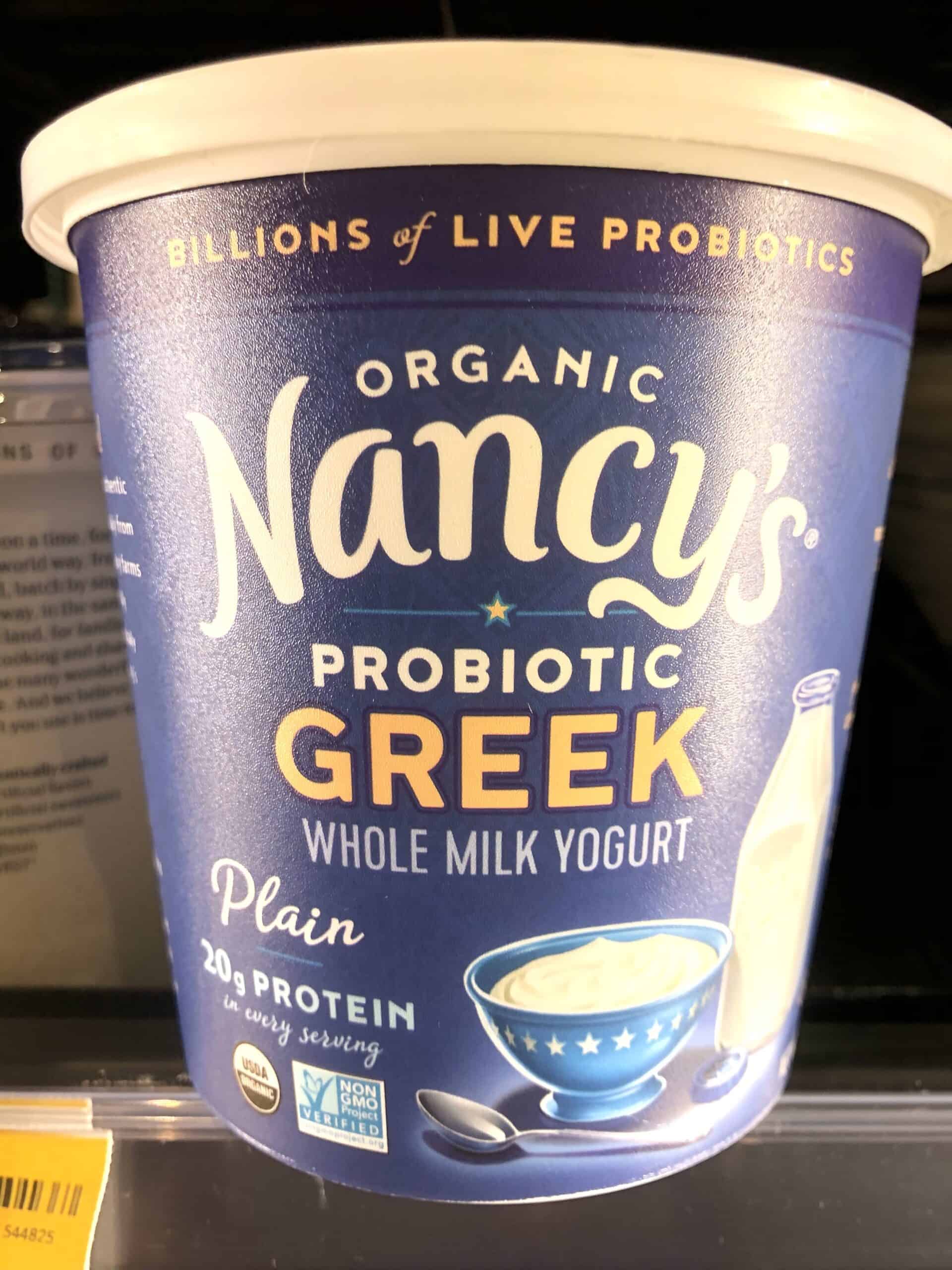
If you’re of a certain age the name Kesey might ring a bell. Chuck Kesey, who owns Nancy’s with his wife Sue, is the younger brother of counterculture hero and novelist Ken Kesey, author of One Flew Over The Cuckoo’s Nest. Thanks to the family connection, when Nancy’s was on the brink of failure, the Grateful Dead played a fundraiser for their friends. And the rest, as they say, is history! But, who is Nancy?
When bookkeeper Nancy Van Brasch Hamren joined Chuck and Sue’s company, she brought her grandmother’s yogurt recipe along with her. Chuck, a food scientist, had the idea of adding live cultures to the mix. Deciding that Nancy’s yogurt sounded better than Chuck’s yogurt, a brand was born. Nancy’s probiotic Greek yogurt is organic and contains 20 or more grams of protein per serving. Keep on truckin’, Nancy’s! Speaking of truckin’, Huey Lewis drove a delivery truck for Nancy’s and rumor has it, it was this experience that inspired his hit Workin’ For A Livin’.
3. The Greek Gods
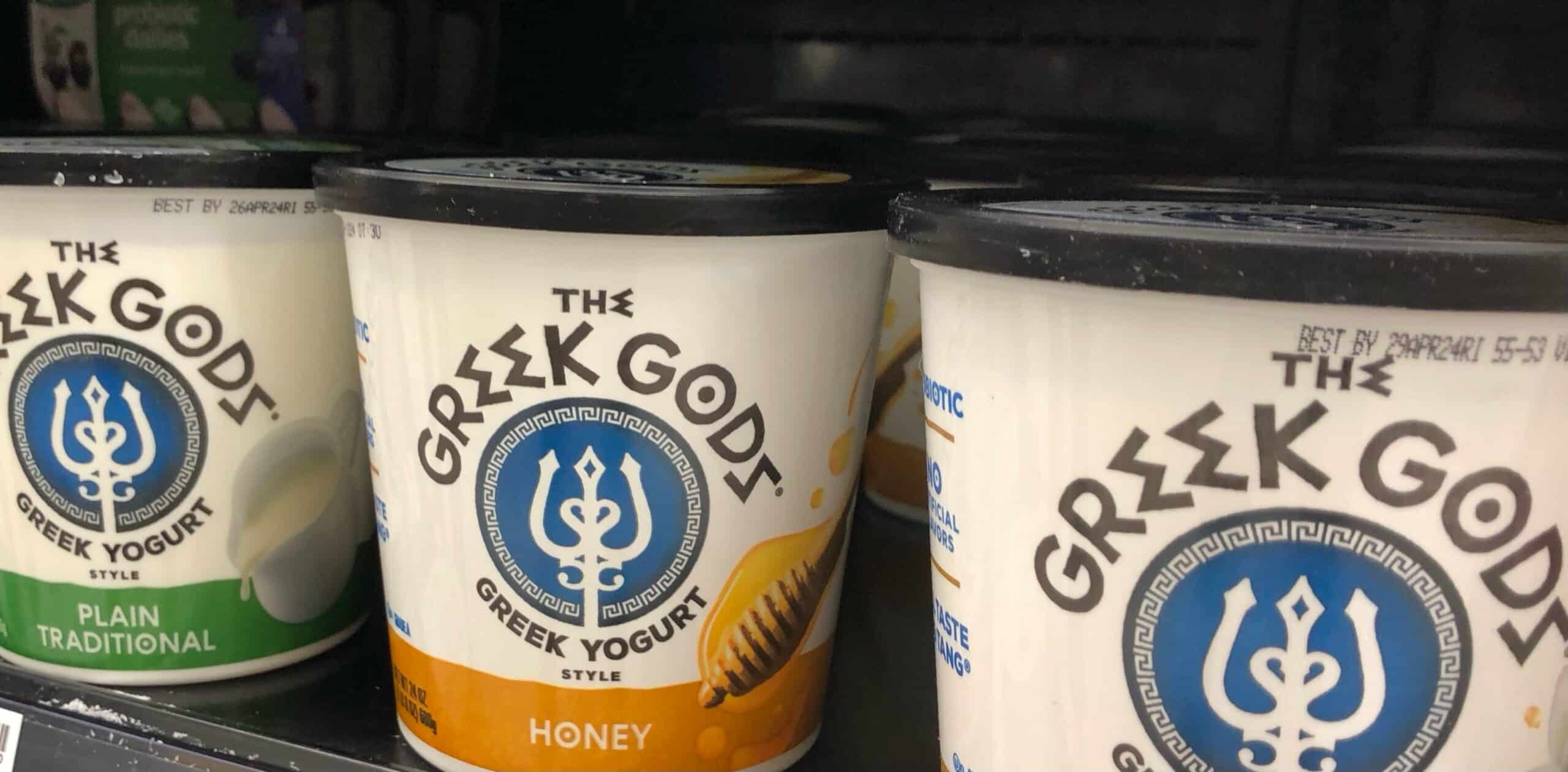
- Parent/owner: Hain Celestial Group
- Introduced: 2004
- Pricepoint: $0.16/ounce
Greek Goods
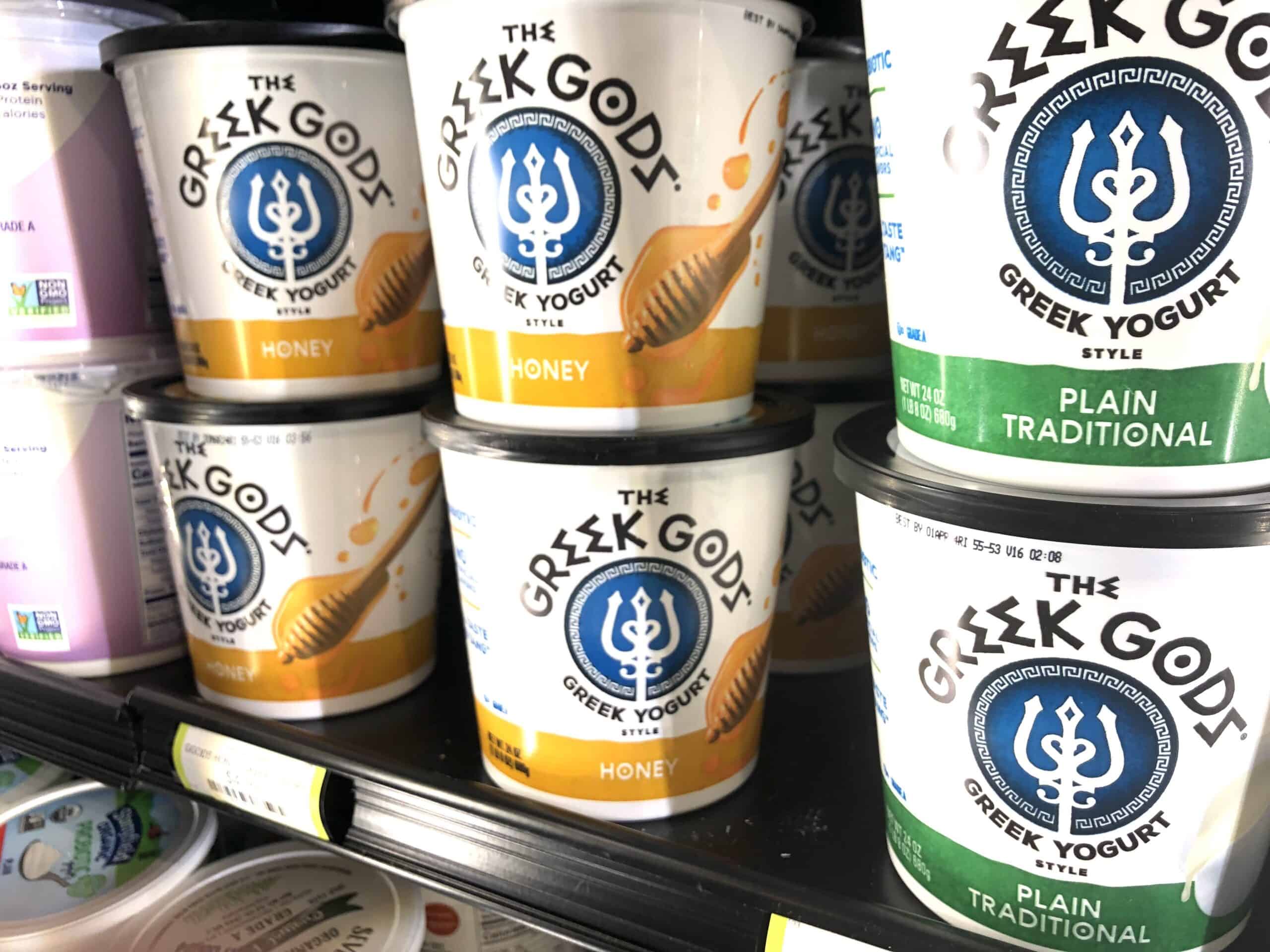
Manufactured in Seattle, Washington, The Greek Gods was founded by three friends (Stephanos Margaritis, Basel Nassar, and Steve Tselios) of Greek ancestry, who originally produced hummus. Purchased by Hain Celestial Group in 2010, the brand continues to offer a top-shelf product and is committed to using natural ingredients, including hormone-free milk and live, active cultures.
4. Chobani
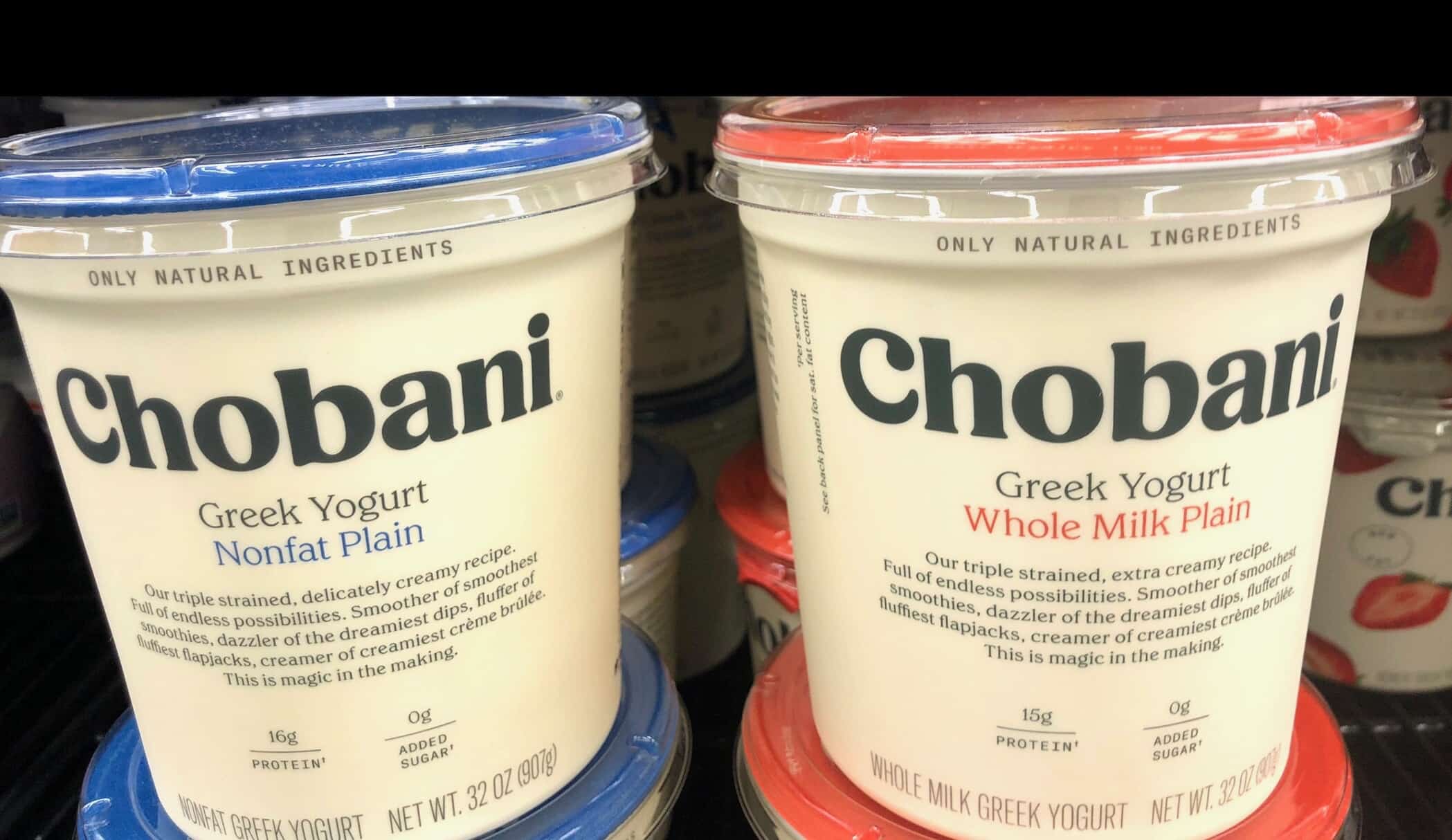
- Parent/owner: Hamdi Ulukaya
- Introduced: 2005
- Pricepoint: $0.19/ounce
Chobani
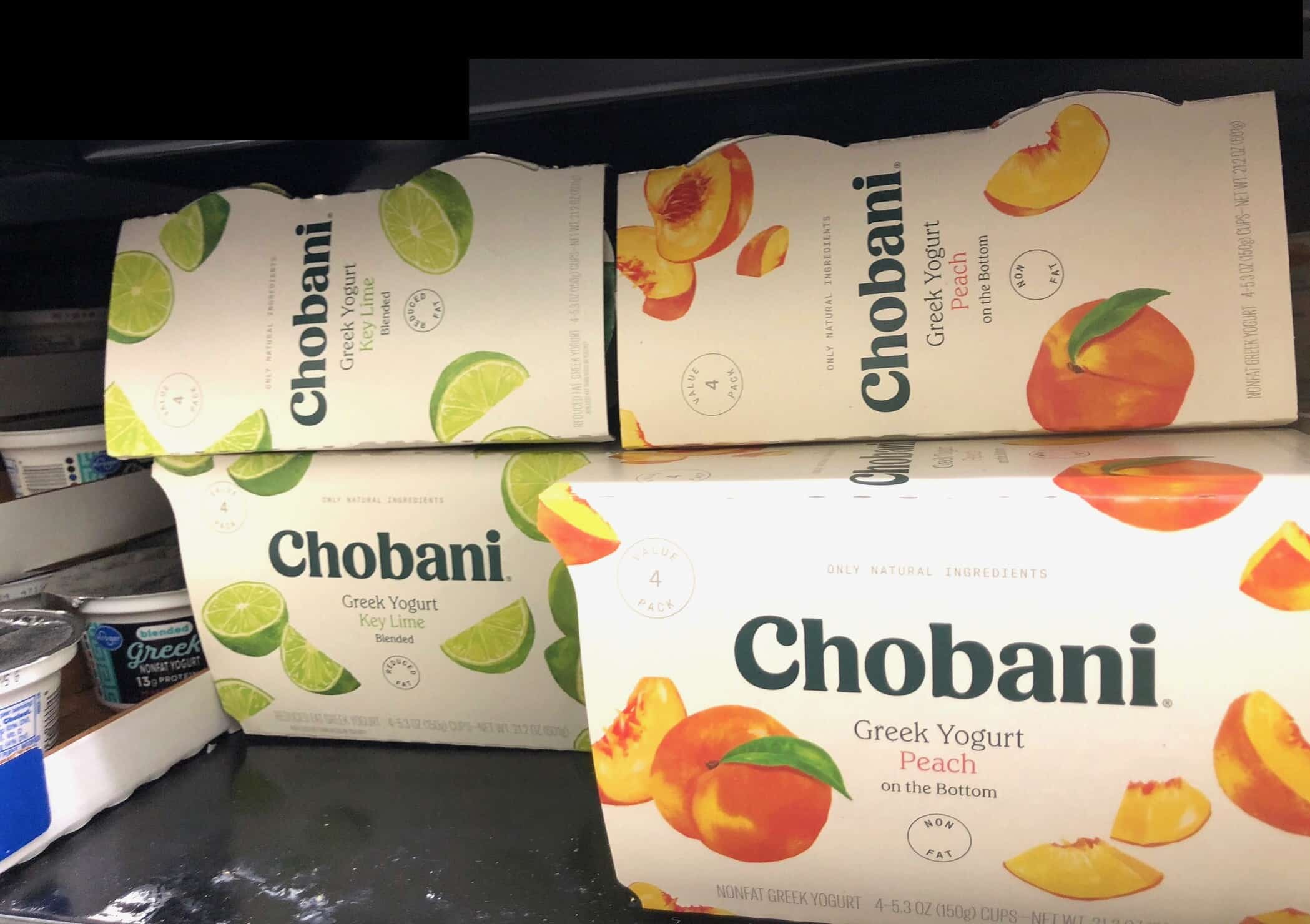
An American company, Chobani was founded in 2005 by Hamdi Ulukaya. The brand quickly emerged as a leading yogurt brand, committed to quality, innovation, and social responsibility. Using high-quality ingredients sourced from local farms, Chobani has expanded its line to include yogurt drinks, non-dairy alternatives, and coffee creamers. The brand is dedicated to supporting local communities and promoting diversity and inclusion. Hamdi Ulukaya, an immigrant himself, has hired many immigrants at Chobani, likening the company to the United Nations. He understands that his most valuable asset is people, both those who work with him and the consumers who support his products. As a result, Chobani is the top-selling yogurt brand in the U.S.
5. Stonyfield
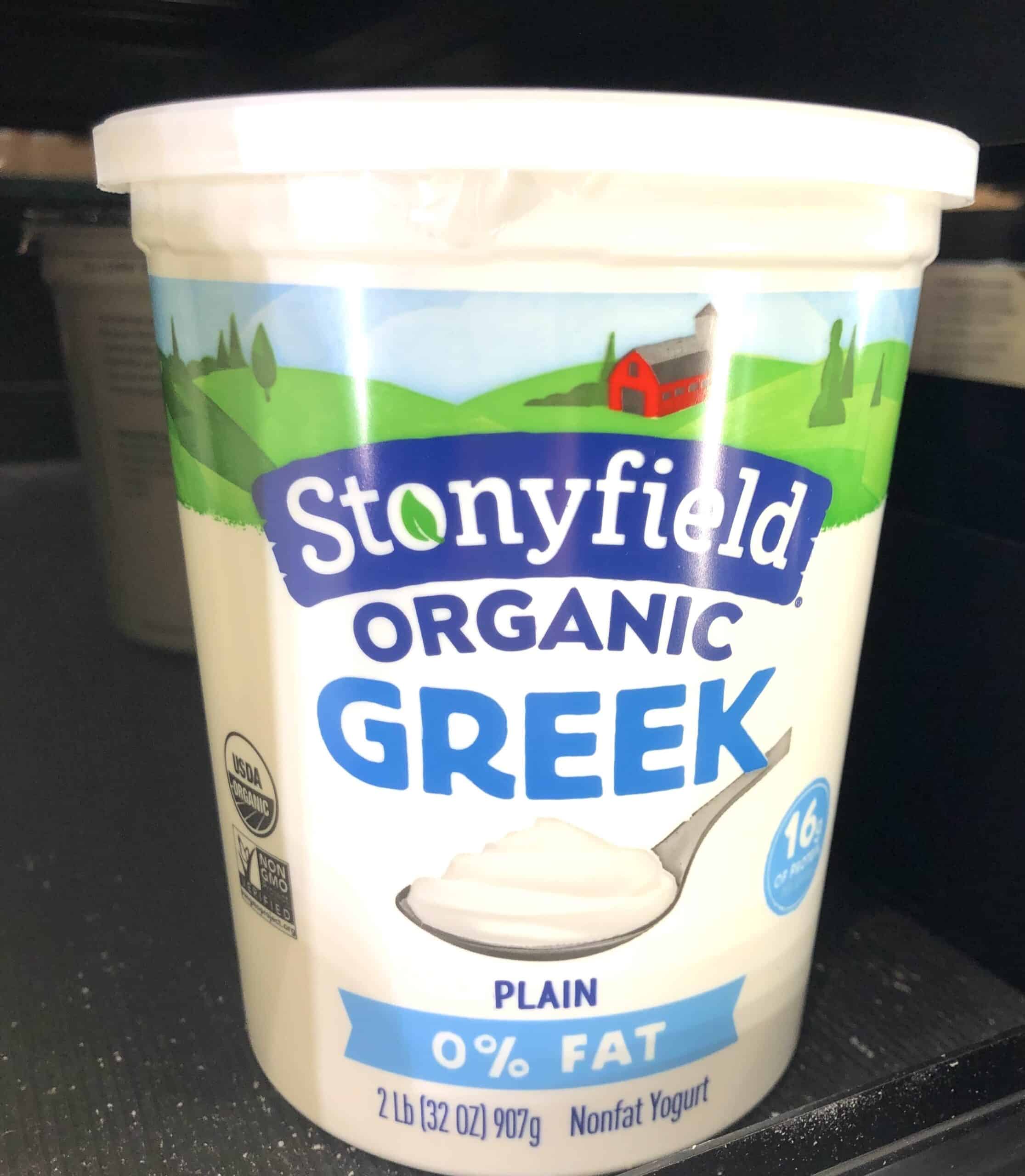
- Parent/owner: Lactalis
- Introduced: 2007
- Pricepoint: $0.23/ounce
First Organic
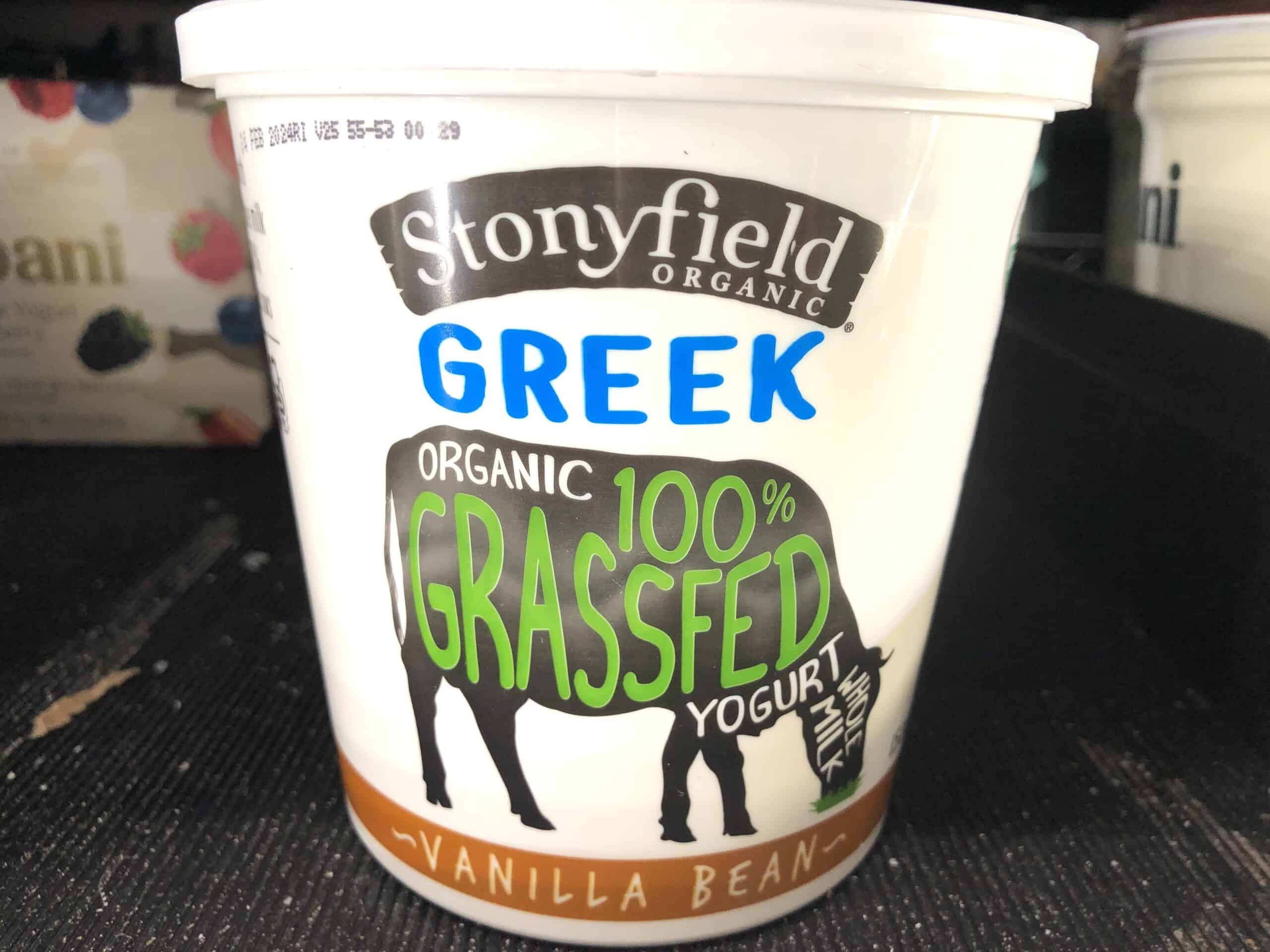
Stonyfield’s Greek yogurt is made from organic milk sourced from pasture-raised cows and is crafted with a commitment to quality and sustainability. The first organic Greek yogurt made in the U.S., the brand emphasizes its use of natural ingredients and the absence of artificial flavors, colors, and preservatives in its products. Starting as an organic farm school in 1983, Stonyfield began producing yogurt in 1985, though it would be 22 years before the brand produced Greek yogurt. With a reputation for using natural, organic ingredients, Stonyfield remains a leader in the yogurt biz.
6. Maple Hill
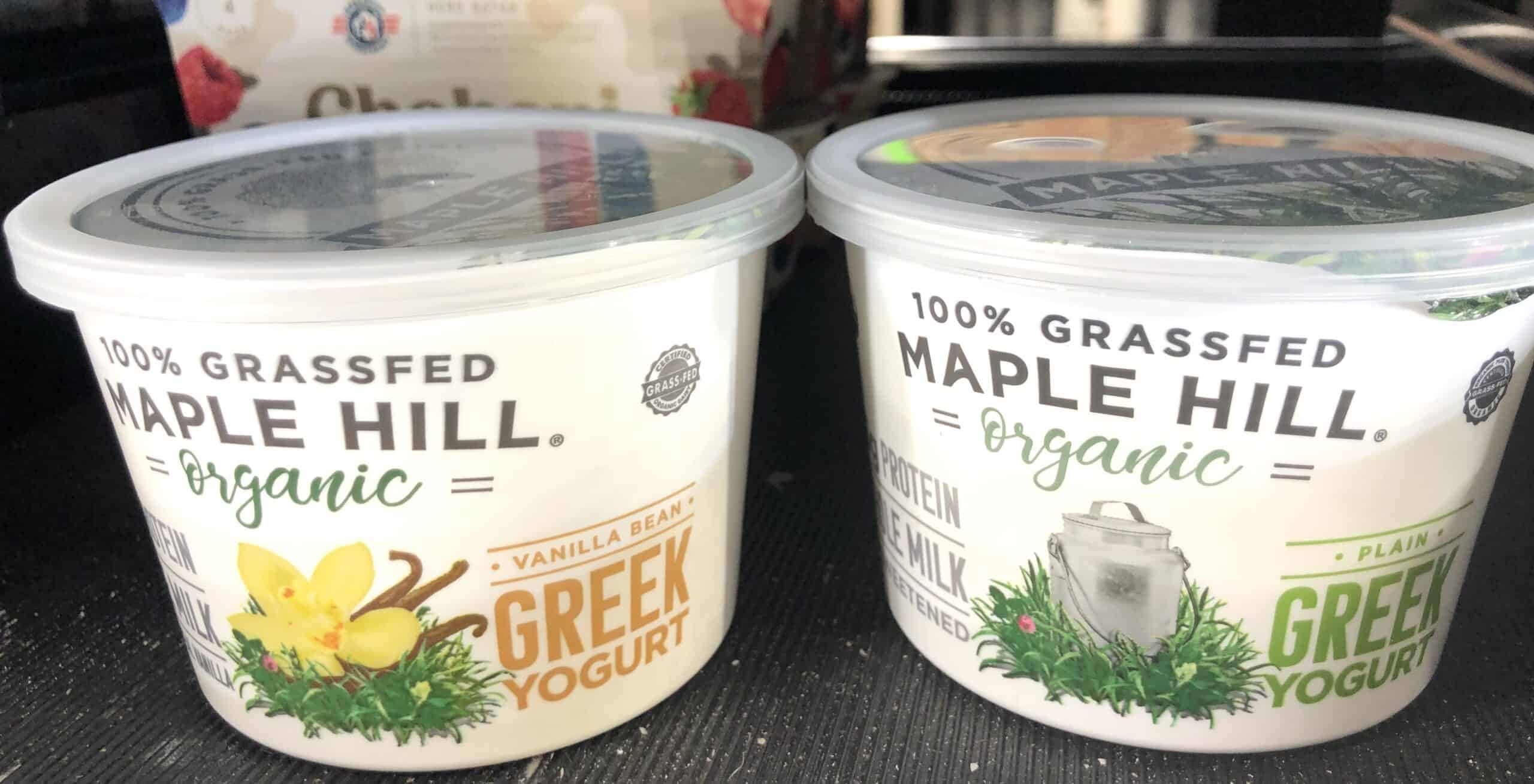
- Parent/owner: Laura and Tim Joseph
- Introduced: 2009
- Pricepoint: $0.23/ounce
Small Company

Of our 10 Greek yogurt brands to try, Maple Hill has one of the more compelling origin stories. Laura and Tim Joseph built New York’s Maple Hill Creamery from the ground up, starting with nothing more than a dream. Along the way, Tim has become a respected dairy farmer, an expert of sorts on regenerative farming, something he discovered by necessity. Lacking the funds necessary to purchase feed, learning about grass-fed cattle was an opportunity waiting to happen, and Tim Joseph embraced it head-on.
Regenerative practices allow cattle to graze on diverse pastures of perennial grasses. This rotational grazing not only provides the cattle with a nutrient-rich diet but also stimulates soil fertility and lowers carbon emissions, while creating community among the herd. Regenerative farming with grass-fed cattle has the potential to mitigate climate change, improve water quality, and support long-term sustainability. The Joesphs have grown Maple Hill Creamery from their original 250-acre farm with 64 head of cattle to 130 farms that average around 50 head. All in the Empire State. All practicing regenerative farming.
7. Oikos
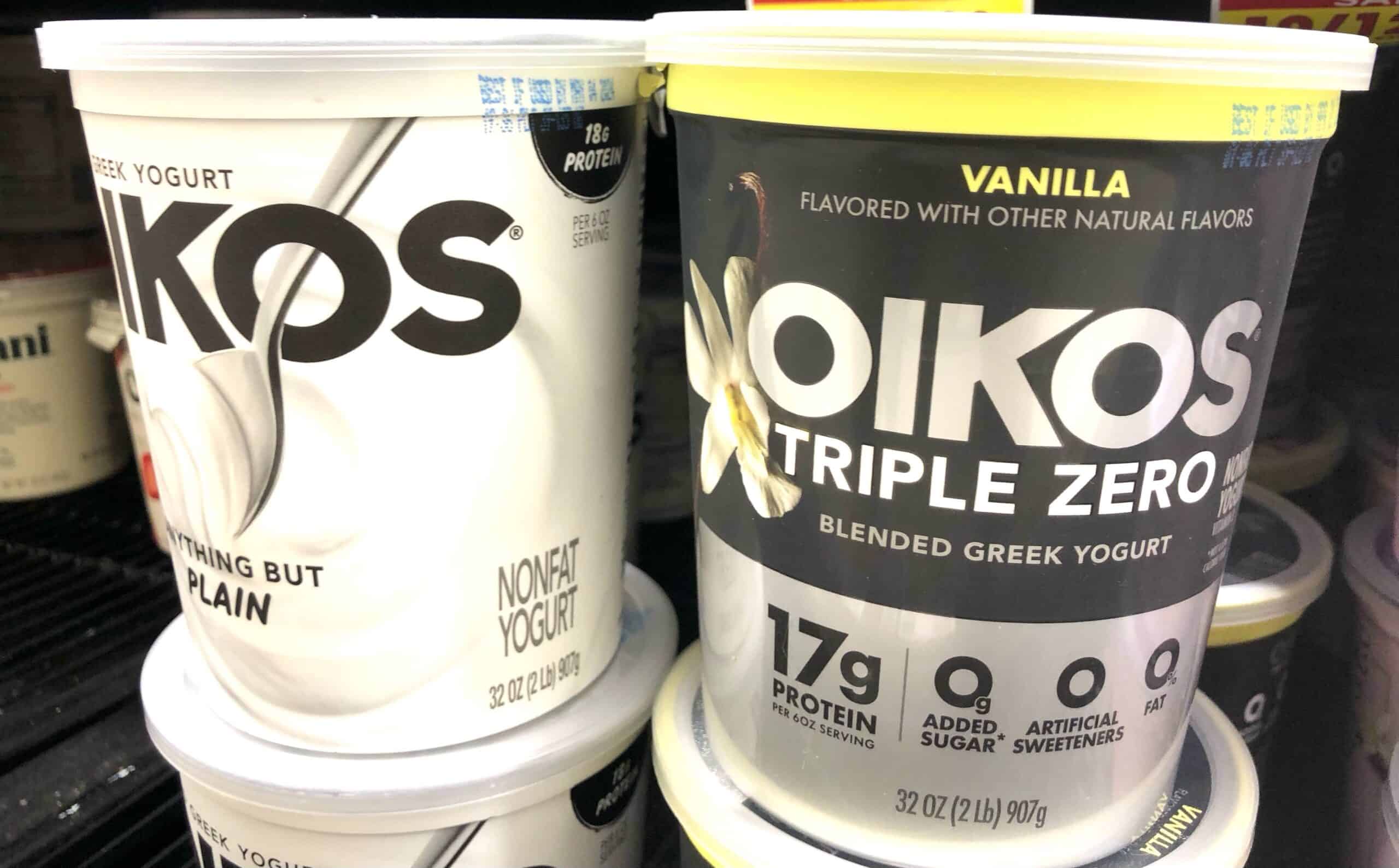
- Parent/owner: Danone S.A.
- Introduced: 2011
- Pricepoint: $0.19/ounce
Okios
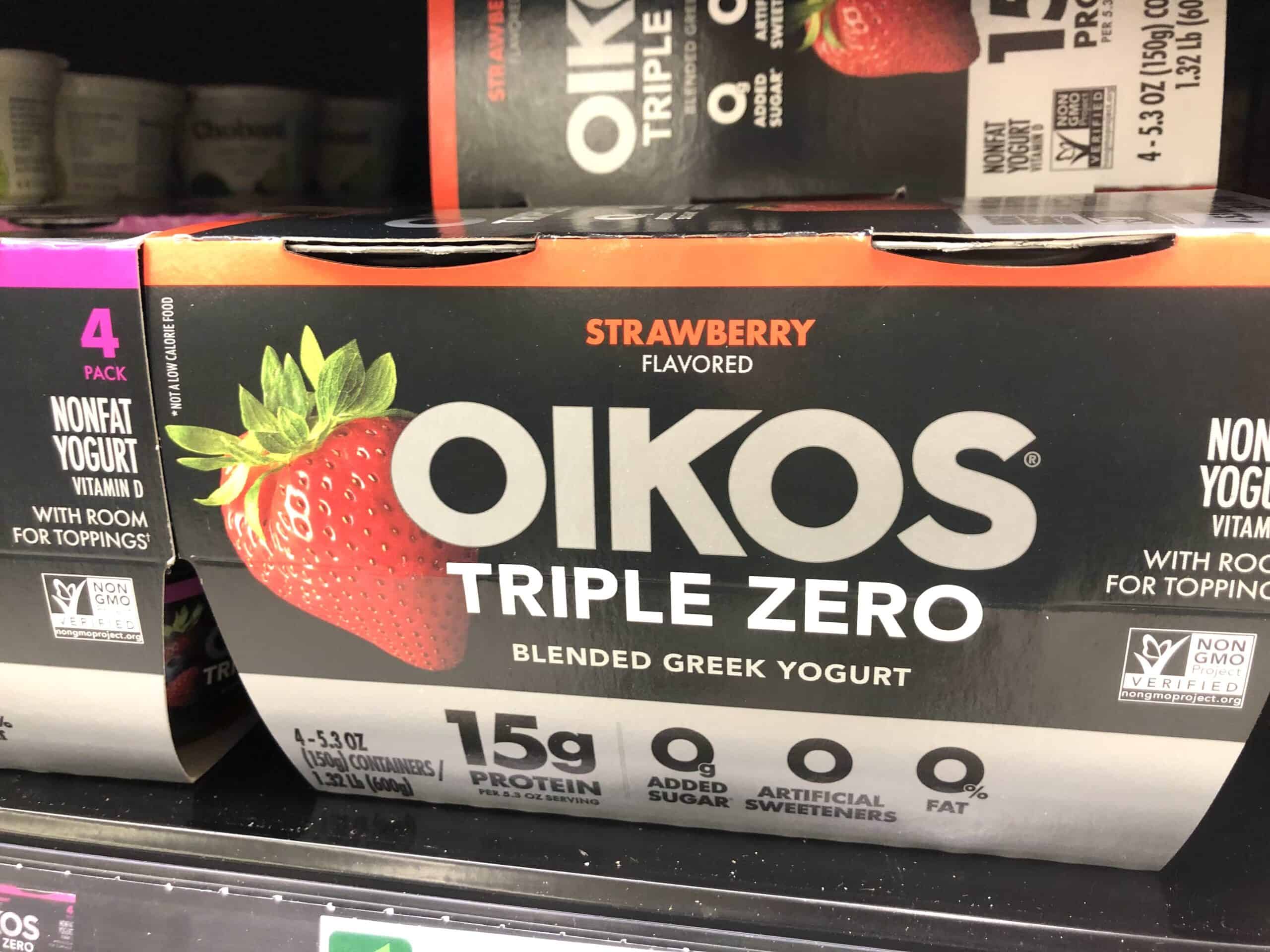
Who knew that the founder of Dannon, Isaac Carasso, was born in Thessaloniki, Greece? Oikos is owned by Danone S.A., a globalopoly headquartered in France, founded by Carasso in 1919. Danone S.A. is known in the U.S. as Dannon. The Oikos brand, introduced in 2011, marked a return to Isaac Carasso’s roots. Oikos comes plain and in a rainbow of fruity flavors. Oikos Triple Zero has no fat, no added sugar, and no artificial sweeteners, though it is lightly sweetened with the natural sugar substitute, stevia.
8. Dannon
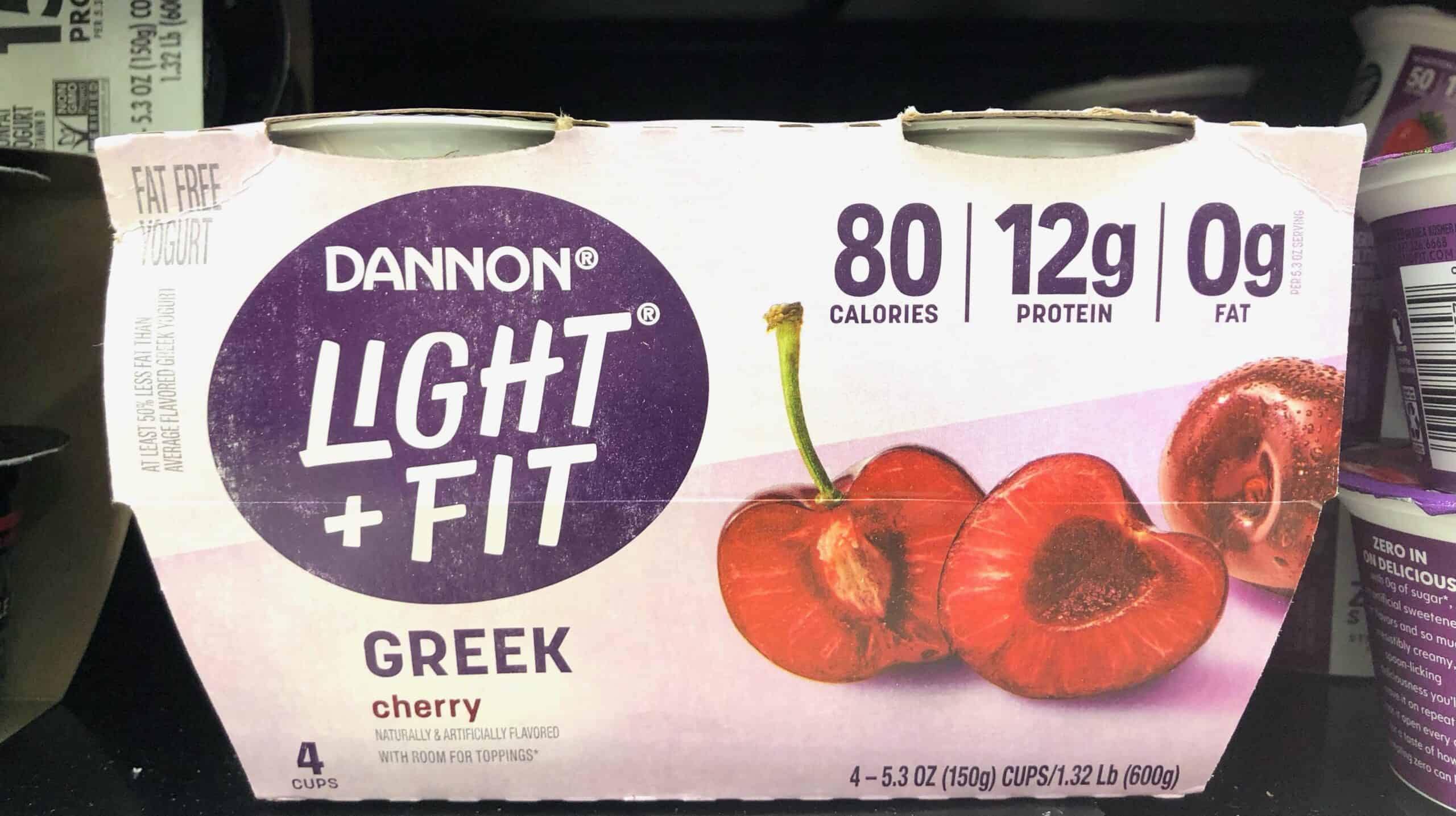
- Parent/owner: Danone S.A.
- Introduced: 2o12
- Pricepoint: $0.16/ounce
Light and Fit
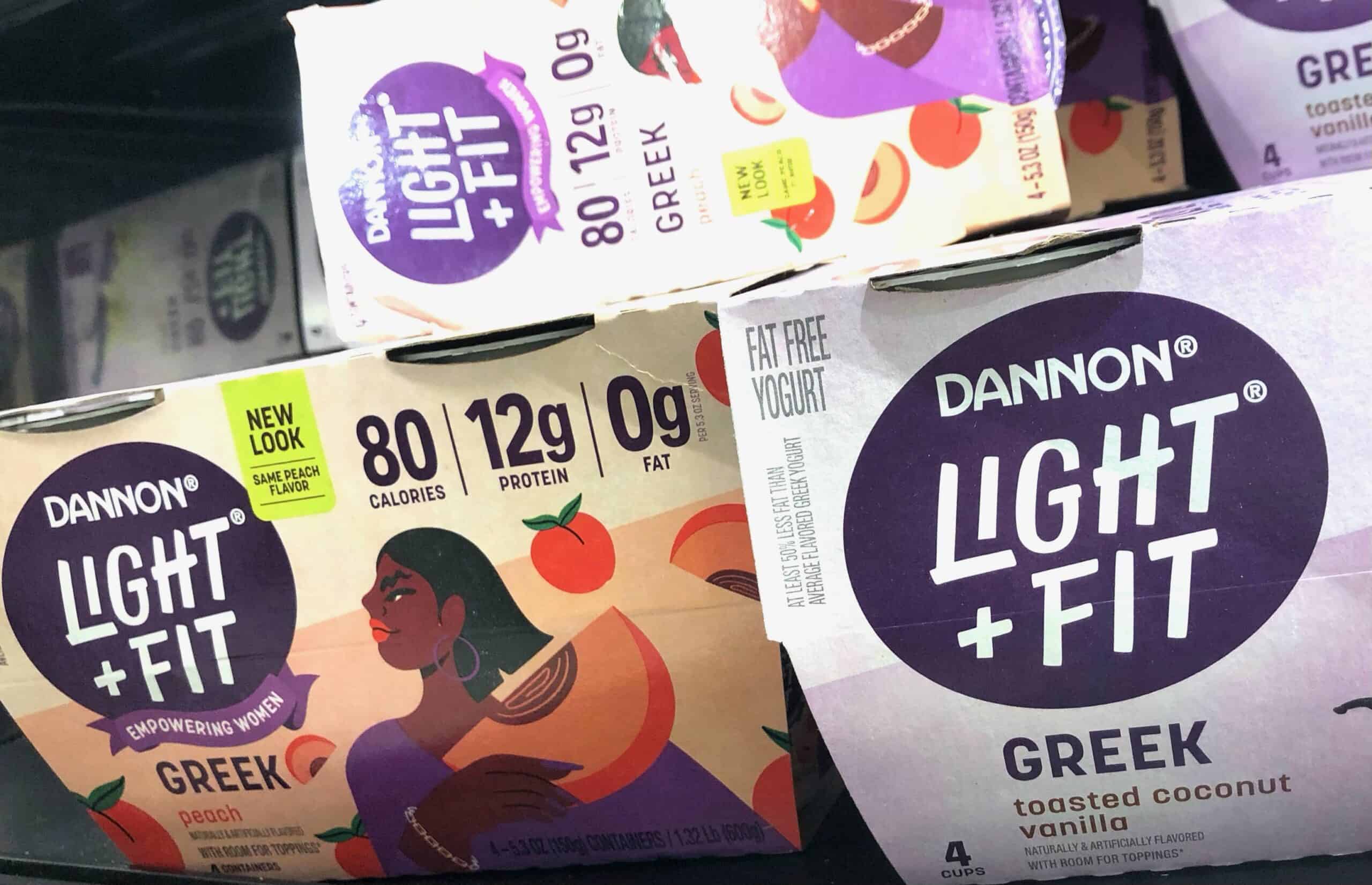
Dannon Light and Fit is Oikos with a different market base. The flavors and the packaging are a little different, but a rose by any other name and so forth… At just 0.16 cents an ounce, Dannon Light and Fit is one of the more affordable options on our list of 10 Greek yogurt brands to try
9. Kite Hill
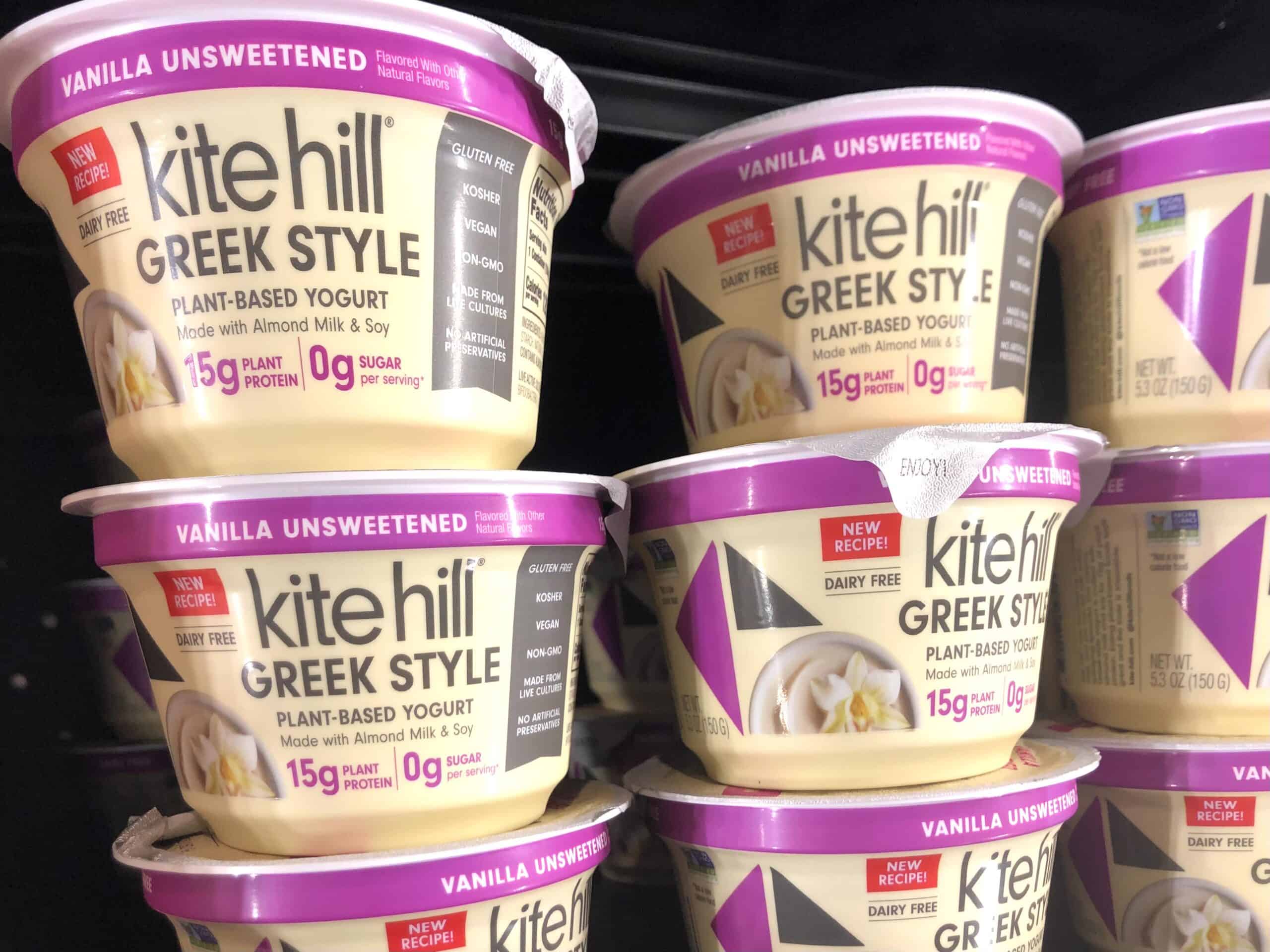
- Parent/owner: Lyrical Foods
- Introduced: 2015
- Pricepoint: $0.31/ounce
Go Fly A Kite
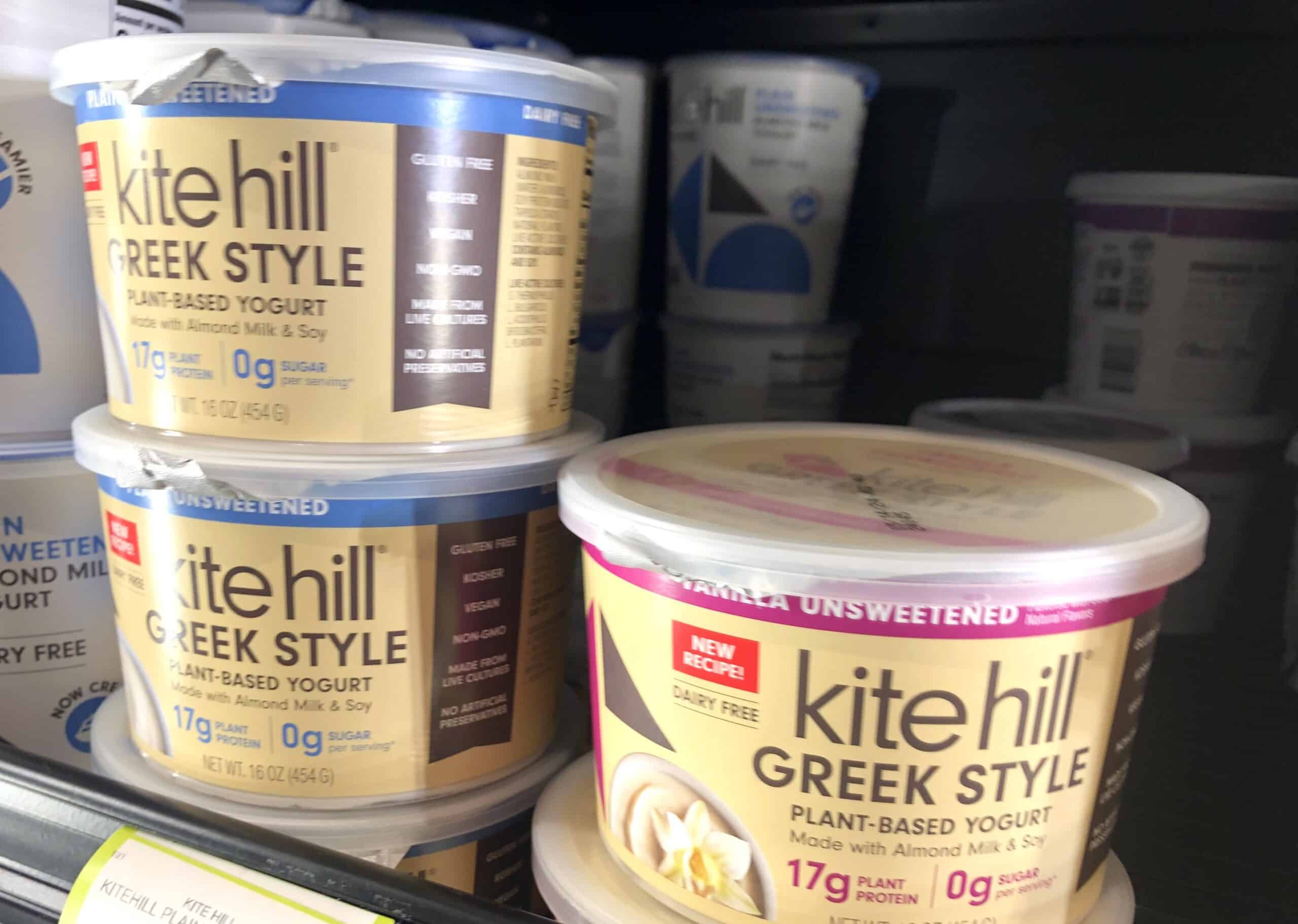
Kite-Hill is a plant-based Greek-style yogurt. Made with almond and soy instead of dairy, Kite Hill is a dandy alternative for the lactose intolerant, dairy-free vegetarians, and vegans. My vegan neighbor knew all about Kite Hill, and she says they make excellent products. She’s also extremely socially conscious and earth-friendly, so if she supports this brand, it’s a safe bet. Kite Hill sources its almonds from California growers and uses natural, non-GMO ingredients.
10. Kroger
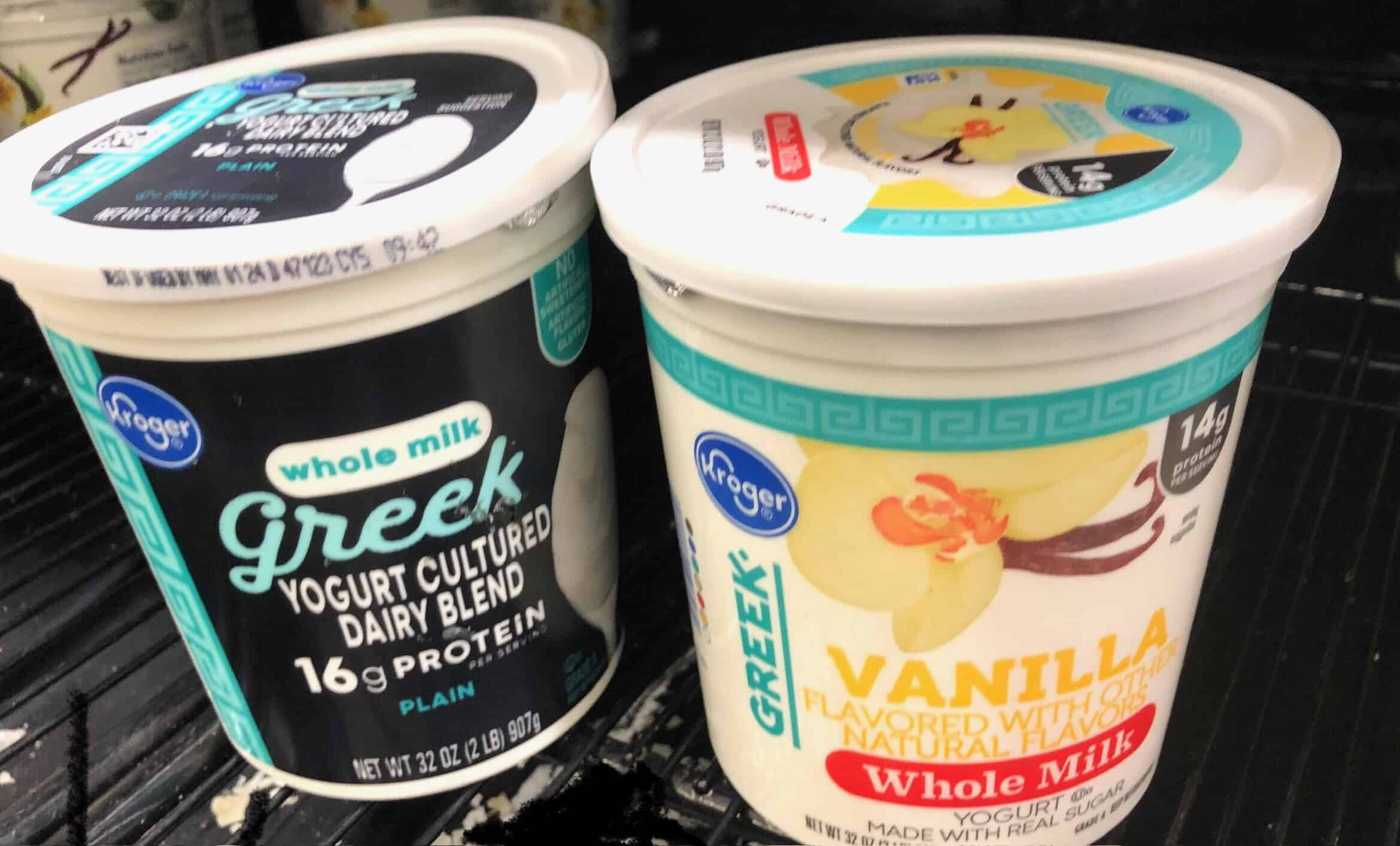
- Parent/owner: The Kroger Company
- Introduced: Undetermined
- Pricepoint: $0.14/ounce
Kroger
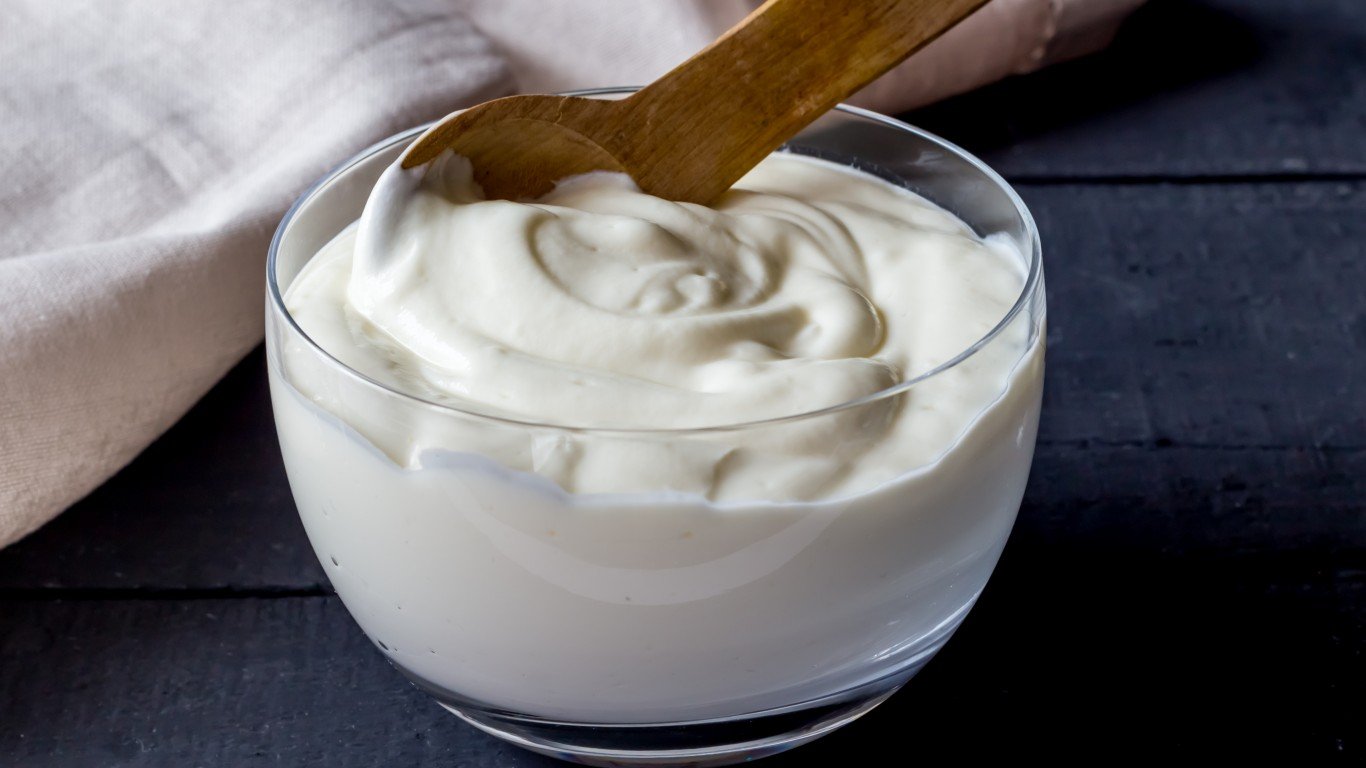
If your town or city is anything like mine, you have more than enough Kroger stores. With three Krogers in a two-mile radius of the house, one must be specific when going shopping. Will we be Krogering at Scary Kroger (our neighborhood store), Starter Kroger (near the Uni and overrun with young lovers), or Kroghetto (now gentrified)? Kroger’s generic store-branded items, in my experience, are as good if not better than some national brands. Kroger Greek yogurt comes in a variety of flavors, including traditional options like plain and vanilla, as well as fruit-infused strawberry, blueberry, and peach. Kroger Greek yogurt is an affordable, budget-friendly choice, and at 0.14 cents an ounce, the least expensive brand on 24/7 Wall St.’s list of 10 Greek yogurt brands to try. Sink your teeth into that.
Essential Tips for Investing: Sponsored
A financial advisor can help you understand the advantages and disadvantages of investment properties. Finding a qualified financial advisor doesn’t have to be hard. SmartAsset’s free tool matches you with up to three financial advisors who serve your area, and you can interview your advisor matches at no cost to decide which one is right for you. If you’re ready to find an advisor who can help you achieve your financial goals, get started now.
Investing in real estate can diversify your portfolio. But expanding your horizons may add additional costs. If you’re an investor looking to minimize expenses, consider checking out online brokerages. They often offer low investment fees, helping you maximize your profit.
Thank you for reading! Have some feedback for us?
Contact the 24/7 Wall St. editorial team.


